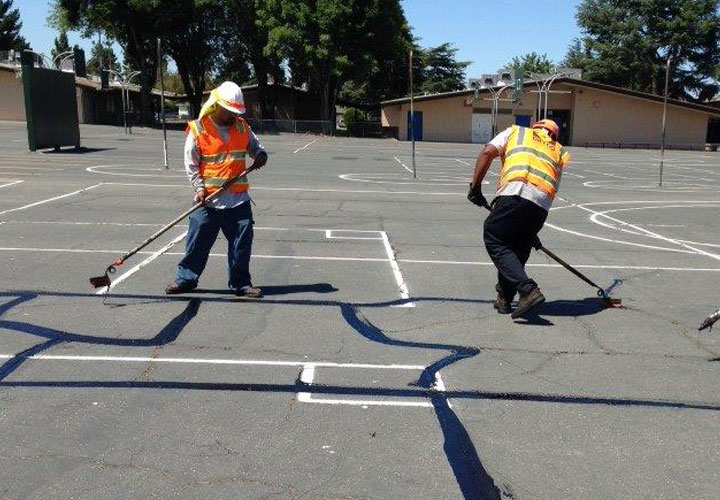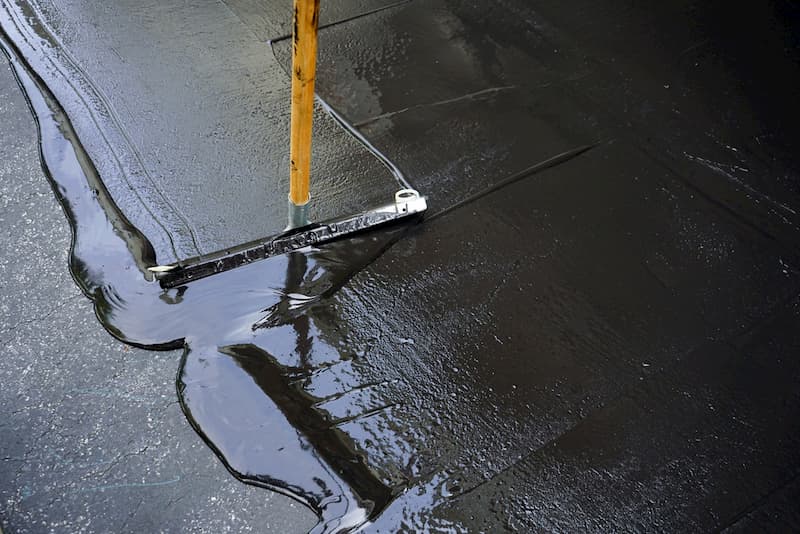Seal in High Quality: Expert Solutions for Asphalt Repair and Sealing
Seal in High Quality: Expert Solutions for Asphalt Repair and Sealing
Blog Article
Cold Mix Asphalt Vs. Hot Mix Asphalt: Which Is Right for You?

Composition Distinctions
Cold mix and warm mix asphalts vary substantially in their make-up, with unique attributes that influence their efficiency and applications. Cold mix asphalt is produced by emulsifying the asphalt binder with water and an emulsifying representative prior to mixing it with accumulation. This technique enables the asphalt to be workable at lower temperature levels, making it perfect for short-lived fixings and for usage in cooler climate condition. Hot mix asphalt, on the other hand, is produced at heats, typically between 300-350 ° F, which assists to attain far better compaction and a more long lasting last product. The warm mix asphalt manufacturing procedure entails heating up the accumulation and asphalt binder separately before incorporating them at the asphalt plant.
Moreover, cold mix asphalt tends to be much less thick and more adaptable than warm mix asphalt. This flexibility makes it better fit for locations with higher degrees of activity, such as driveways or roadways with heavy website traffic. In comparison, warm mix asphalt is understood for its high durability and resistance to rutting and breaking, making it a recommended choice for freeways and high-traffic roads where durability is essential.
Setup Process Differences
The process of mounting cold mix and warm mix asphalt exhibits remarkable variances in their requirements and procedures. Cold mix asphalt, being an extra versatile material, can be applied straight from the bag or container onto the pothole or damaged area. It needs very little preparation job, such as cleaning up the location and compacting the cool blend with hand devices. This makes it a practical option for short-lived and fast repairs. On the other hand, warm mix asphalt demands an extra fancy installation procedure. It involves heating up the mix to heats prior to laying it down on a correctly ready base. The preparation consists of compacting the base, using a tack coat, and utilizing heavy machinery like pavers and compactors for a durable and smooth surface. Due to the heating needs, hot mix asphalt setups are normally executed by experts with specialized devices, guaranteeing an extra structurally audio and permanent result.
Toughness and Longevity Aspects
When taking into consideration asphalt choices, resilience and durability are essential factors to evaluate for long-term sidewalk efficiency. Hot mix asphalt (HMA) is known for its exceptional durability and long life.
In regards to durability, HMA typically outmatches CMA because of its exceptional strength and resistance residential or commercial properties. HMA sidewalks have a longer life span, needing much less constant repair work and upkeep, which can equate to set you back savings in the future. Furthermore, HMA sidewalks are much more conveniently adjustable to meet certain project demands, better boosting their toughness.
Expense Considerations
Considering the monetary effects is a vital aspect when assessing the choice between warm mix asphalt (HMA) and cold mix asphalt (CMA) for pavement jobs. While the first cost of warm mix asphalt is typically more than that of chilly mix asphalt, HMA often offers an extra cost-effective solution over time due to its premium sturdiness and longevity. HMA is known for its capacity to withstand heavy web traffic loads and extreme climate conditions, decreasing the requirement for regular repair services and upkeep. On the other hand, cold mix asphalt is extra affordable upfront however may require even more regular patching and resurfacing, causing greater upkeep expenses with time.
In enhancement to material expenses, it's vital to think about the costs linked with setup and upkeep when comparing HMA and CMA. Eventually, the decision between HMA and CMA need to take into account not simply the preliminary price however additionally the long-term economic ramifications to determine the most economical option for the certain pavement job.
Environmental Influence Comparison
Comparison of the ecological influences in between warm mix asphalt (HMA) and cool mix asphalt (CMA) reveals unique differences in sustainability practices. HMA production requires high temperatures, leading to boosted power usage and greenhouse gas discharges.
Furthermore, the use of CMA frequently involves reusing existing asphalt pavement, promoting resource preservation and decreasing the amount of waste sent out to garbage dumps. By choosing for CMA over HMA, roadway building jobs can contribute favorably to environmental conservation efforts.
Conclusion
To conclude, the choice in between cold mix asphalt (CMA) and warm mix asphalt (HMA) depends on different factors such as structure, installation procedure, resilience, durability, price, and environmental influence. angle parking. While CMA supplies a quick and affordable remedy for small check it out repair work, HMA makes certain exceptional toughness and longevity for heavy web traffic locations. Take into consideration these aspects carefully to identify which sort of asphalt is the ideal selection for your paving requires

Thinking about the financial ramifications is an essential element when evaluating the selection in between warm mix asphalt (HMA) and cool mix asphalt (CMA) for sidewalk tasks. While the initial expense of warm mix asphalt is generally greater than that of cool mix asphalt, HMA commonly provides a more cost-efficient service in the long run due to its remarkable resilience and durability. angle parking.Contrast of the ecological influences between hot mix asphalt (HMA) and cold mix asphalt (CMA) discloses distinctive differences in sustainability practices.In verdict, the choice in between cool mix asphalt (CMA) and warm mix asphalt (HMA) depends on numerous factors such as composition, setup procedure, resilience, long life, cost, and environmental read review effect
Report this page